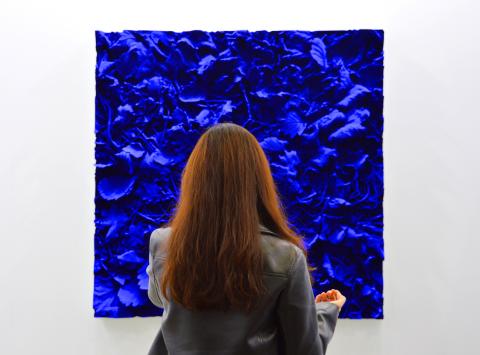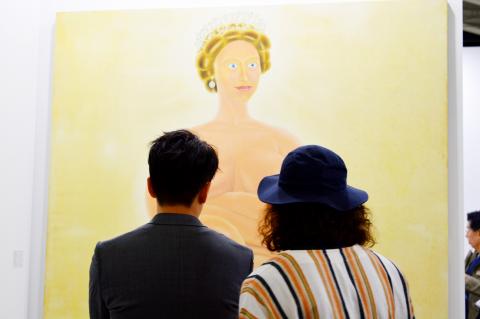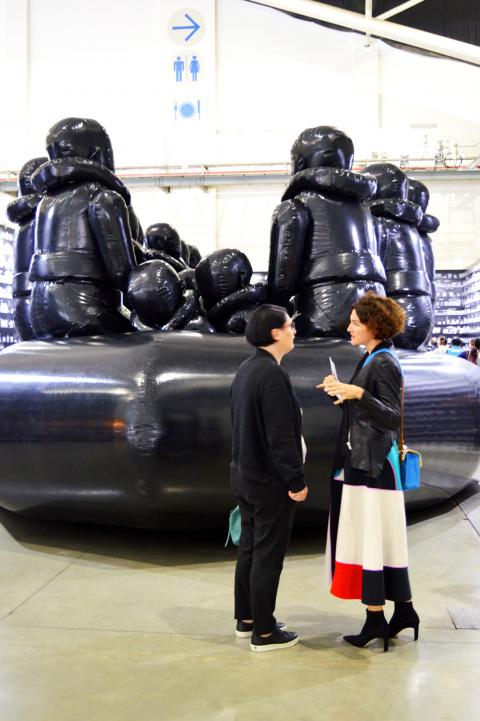“We hope to make Taipei Dangdai the most important event in the art scene around the world and in Asia,” was co-director Robin Peckham’s speech opening, speaking in Mandarin as a nod to the local market. Returning for a second year, Dangdai’s (台北當代) goal is to put Taipei on the map for the art world.
Asia is already a leading force in the global art market, and it is only expected to grow in importance in the upcoming years. However, which cities play a key role is constantly changing — especially in light of unstable business in Hong Kong over the last year.
“Taipei city is vibrant and collectors are hungry,” said Mariko Kawashima, director of Axel Vervoordt Gallery Hong Kong, one of the newcomers this year amongst 99 galleries — 23 of which have spaces in Taiwan.

Photo: Ella Csarno
Dangdai’s co-founder Magnus Renfrew said there is interest from galleries around the world in potentially joining next year.
COLLECTORS DO THEIR HOMEWORK
International galleries were impressed by the Taiwanese crowd.

Photo: Ella Csarno
“For a small country, it’s astonishing that there are so many collectors,” said Rachel Lehmann, co-owner of Lehmann Maupin. “They do their homework very well, and they collect in depth.”
It was a sentiment echoed by gallerist Sean Kelly.
“People here are very sophisticated, they understand quality,” Kelly said.

Photo: Ella Csarno
Though Kawashima said they are still learning about Taiwanese collectors, Kelly believes in bringing recognizable names and leading works to Taiwan. Indeed, the number of artworks from world-renowned artists like Marina Abramovic, Anish Kapoor, Ai Weiwei (艾未未) or Julian Opie have gone up considerably.
Galleries reported successful sales. David Zwirner sold multiple artworks within the first two hours of the fair, mostly to Taiwanese collectors. TKG+, the contemporary branch of Taiwanese Tina Keng Gallery (耿畫廊), said they were happy with the results, and, perhaps more importantly, made connections to new collectors.
NOT JUST FOR PROFIT
Backed by the Ministry of Culture, the Bureau of Foreign Trade and Taipei’s Department of Cultural Affairs, Dangdai provided a platform for many artists who were never presented in Taiwan before.
Oscar Murillo, co-winner of last year’s Turner Prize, who hosted a talk at the “Ideas” program of the fair, where he said that collaboration with a local institution is on the horizon for him.
Lehmann Maupin are also working with the Taipei Fine Arts Museum (臺北市立美術館) on a show about Erwin Wurm curated by Jerome Sans, and a solo exhibition with Tony Oursler at Kaohsiung Museum of Fine Art (高雄市立美術館).
THINKING LONG TERM
Shanghai and Hong Kong used to be absolute centers for the market in Asia, but international galleries have started diversifying, setting their foot in multiple cities. This mindset comes as political tension in Hong Kong caused a dip in the business of galleries last year.
“The art world is not isolated,” said Lehmann, “but with long-term strategies it’s easier to adapt to change.”
Arthur de Villepin, founder of Villepin, a gallery opening in Hong Kong in March added: “The energy of Hong Kong is beyond the political situation. The fact that it dilutes itself in the region is not a bad thing.”
Alongside his father, former French prime minister Dominique de Villepin, he hopes to open a salon-like space where long-term relationships with artists and collectors can be built.
“Cultural difference is richness to me,” he said.
Ultimately events like Dangdai continue to lay the foundations of Taipei as a safe haven for art. Taipei Dangdai will return again in January next year, promising a longer lineup.

In Taiwan there are two economies: the shiny high tech export economy epitomized by Taiwan Semiconductor Manufacturing Co (TSMC, 台積電) and its outsized effect on global supply chains, and the domestic economy, driven by construction and powered by flows of gravel, sand and government contracts. The latter supports the former: we can have an economy without TSMC, but we can’t have one without construction. The labor shortage has heavily impacted public construction in Taiwan. For example, the first phase of the MRT Wanda Line in Taipei, originally slated for next year, has been pushed back to 2027. The government

July 22 to July 28 The Love River’s (愛河) four-decade run as the host of Kaohsiung’s annual dragon boat races came to an abrupt end in 1971 — the once pristine waterway had become too polluted. The 1970 event was infamous for the putrid stench permeating the air, exacerbated by contestants splashing water and sludge onto the shore and even the onlookers. The relocation of the festivities officially marked the “death” of the river, whose condition had rapidly deteriorated during the previous decade. The myriad factories upstream were only partly to blame; as Kaohsiung’s population boomed in the 1960s, all household

Allegations of corruption against three heavyweight politicians from the three major parties are big in the news now. On Wednesday, prosecutors indicted Hsinchu County Commissioner Yang Wen-ke (楊文科) of the Chinese Nationalist Party (KMT), a judgment is expected this week in the case involving Hsinchu Mayor Ann Kao (高虹安) of the Taiwan People’s Party (TPP) and former deputy premier and Taoyuan Mayor Cheng Wen-tsan (鄭文燦) of the Democratic Progressive Party (DPP) is being held incommunicado in prison. Unlike the other two cases, Cheng’s case has generated considerable speculation, rumors, suspicions and conspiracy theories from both the pan-blue and pan-green camps.

Stepping inside Waley Art (水谷藝術) in Taipei’s historic Wanhua District (萬華區) one leaves the motorcycle growl and air-conditioner purr of the street and enters a very different sonic realm. Speakers hiss, machines whir and objects chime from all five floors of the shophouse-turned- contemporary art gallery (including the basement). “It’s a bit of a metaphor, the stacking of gallery floors is like the layering of sounds,” observes Australian conceptual artist Samuel Beilby, whose audio installation HZ & Machinic Paragenesis occupies the ground floor of the gallery space. He’s not wrong. Put ‘em in a Box (我們把它都裝在一個盒子裡), which runs until Aug. 18, invites